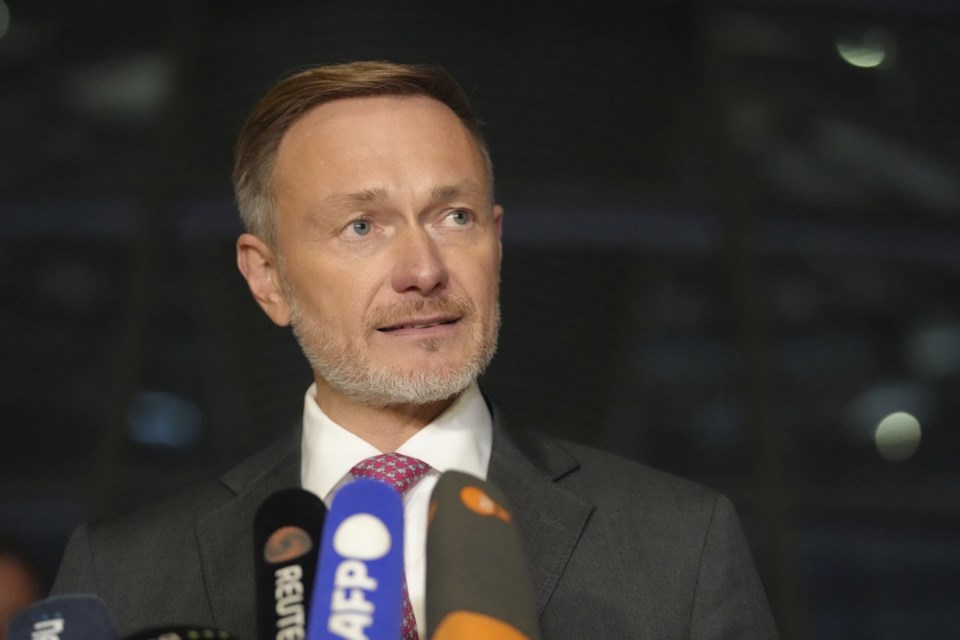BERLIN (AP) ŌĆö GermanyŌĆÖs center-left announced Wednesday he was firing Finance Minister Christian Lindner, signaling the collapse of the ruling three-party coalition that relied on LindnerŌĆÖs pro-business party.
Scholz announced the move at a news conference over ways to boost the country's ailing economy. He said he would seek a vote of confidence in January that he said might lead to early elections that otherwise would be due next September.
ŌĆ£I feel compelled to take this step to prevent damage to our country. We need an effective government that has the strength to make the necessary decisions for our country," Scholz said.
Lindner, from the pro-business Free Democrats, had rejected tax increases or changes to GermanyŌĆÖs strict self-imposed limits on running up debt. ScholzŌĆÖs Social Democrats and the environmental Greens, who are also part of the coalition, wanted to see massive state investment and rejected the Free Democrats' proposals to cut welfare programs.
Lindner responded to his dismissal by accusing Scholz of failing "to recognize the need for a new economic awakening in our country. He has played down the economic concerns of the citizens.ŌĆØ
He said the chancellor's proposals to reenergize the economy were ŌĆ£dull, unambitious and make no contribution to overcoming the fundamental weakness of our countryŌĆÖs growth.ŌĆØ
Scholz said about Lindner that ŌĆ£he has broken my trust too often. He even unilaterally canceled the agreement on the budget. After we had already agreed on it in long negotiations. There is no basis of trust for further cooperation. Serious government work is not possible like this.ŌĆØ
He accused Lindner of publicly calling for a fundamentally different economic policy, including what Scholz said would be tax cuts worth billions for a few top earners while at the same time cutting pensions for all pensioners. ŌĆ£That is not decent,ŌĆØ Scholz said.
Scholz said he would seek the vote of confidence in Germany's Bundestag, or parliament, on Jan. 15, which would "allow the members of the Bundestag to decide whether to clear the way for early elections.ŌĆØ The election could then ŌĆ£take place by the end of March at the latest, in compliance with the deadlines set out in constitution," he said.
The regular election is scheduled for September 2025.
GermanyŌĆÖs economy is in 2024 for the second year in a row, or at best stagnate, battered by external shocks and home-grown problems including red tape and a shortage of skilled labor.
ScholzŌĆÖs center-left Social Democrats, Vice Chancellor Robert HabeckŌĆÖs environmentalist, left-leaning Greens and LindnerŌĆÖs pro-business Free Democrats ŌĆö a party that in recent decades has mostly allied with conservatives ŌĆö set out in 2021 to form an ambitious, progressive coalition straddling ideological divisions that would modernize Germany.
The government can point to achievements: preventing an energy crunch after Russia to Germany, initiating the and a series of social reforms. But the impression it has left with many Germans is of deepening dysfunction.
Ahead of the vote of confidence in January, Scholz said he would reach out to opposition leader Friedrich Merz of the center-right Christian Democrats to confer on possible ways of strengthening the economy and defense.
ŌĆ£I will now very quickly seek talks with the leader of the opposition,ŌĆØ Scholz said. He said he wants to offer Merz the possibility of working together on issues ŌĆ£that are crucial for our country, on quickly strengthening our economy and our defense."
Kirsten Grieshaber, The Associated Press



